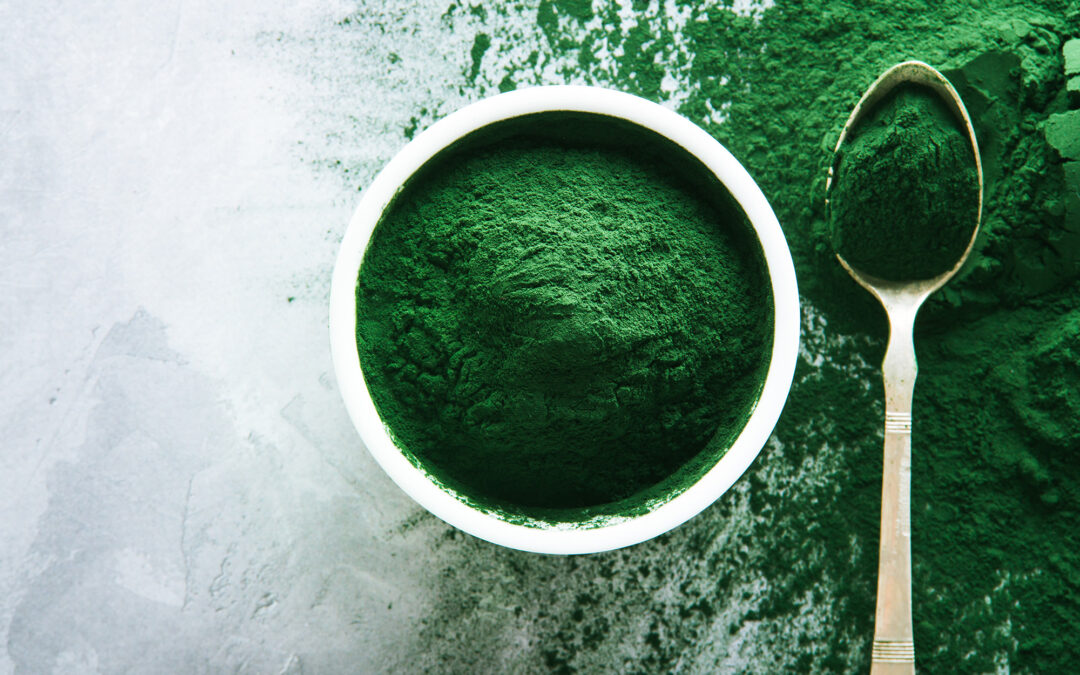The term “superfood” is not a scientifically defined category, and its use can be somewhat subjective. The ‘foods’ I have decided to include here as superfoods are due to the broad range of nutrients and the fact that they are not consumed daily by many. I advocate for adding goodness to the daily diet that is not in pill form whenever possible. For that reason, I have chosen the top five superfoods that you should try today!
1. Spirulina: This blue-green algae is rich in protein, vitamins, and minerals. It’s known for boosting the immune system, improving gut health, and providing a clean energy boost.
Protein: Spirulina is a fantastic source of plant-based protein, making it an ideal addition for vegetarians and vegans. One tbsp of spirulina offers 4g of protein (Denise Mann, 2023).
Nutrients: Spirulina is known for its immune-boosting properties, thanks to its high concentration of vitamins like B6 and B12, iron, and magnesium.
Detoxifying: Additionally, spirulina is a potent detoxifier, aiding in removing heavy metals from the body (Bhattacharya, 2020).
Not all brands of spirulina are equal, and some can contain heavy metals, which spirulina should be removing from the body, not adding to the burden. I recommend trying the Nutrex Hawaii brand (Not an affiliate).
Here’s a simple and delicious way to incorporate spirulina into your diet:
Spirulina Smoothie Bowl
Ingredients:
1 cup of frozen berries
1/2 cup of spinach leaves
½ ripe avocado
1/2 cup of unsweetened hemp milk (other nut milk is ok too)
One teaspoon of spirulina powder
Toppings: sliced fresh fruit, granola, chia seeds, and a drizzle of honey (optional)
Instructions:
In a blender, combine the frozen berries, spinach leaves, avocado, hemp milk, and spirulina powder.
Blend until smooth and creamy, adjusting the milk quantity to achieve your desired consistency.
Pour the spirulina smoothie into a bowl.
Add your favorite toppings, such as sliced fresh fruit, granola, chia seeds, and a drizzle of honey for extra flavor.
Enjoy your vibrant and nutritious spirulina smoothie bowl, packed with essential nutrients and energy-boosting goodness!
2. Moringa: Moringa is often regarded as a superfood due to its exceptional nutritional content and health benefits. Here’s why it’s considered a nutritional powerhouse:
Rich in Nutrients: Moringa leaves are packed with essential vitamins and minerals. They contain high levels of vitamin C, vitamin A, vitamin E, calcium, potassium, and iron, making them a great source of key nutrients for overall health (Michael Greger M.D. FACLM, 2012).
Antioxidant Properties: Moringa is loaded with antioxidants, such as quercetin, chlorogenic acid, and beta-carotene. Generally speaking, antioxidants help combat oxidative stress and protect the body’s cells from damage.
Anti-Inflammatory: It has anti-inflammatory properties, which can help reduce inflammation in the body, which is the beginning of many chronic issues.
Blood Sugar Regulation: Some studies suggest that Moringa may help regulate blood sugar levels, which can be particularly valuable for individuals with diabetes (Phimarn et al., 2021).
The most common method of consuming Moringa is in powder form in smoothies, soups, or even sprinkled on salads. Start with a small amount and gradually increase your intake to suit your taste.
You can also drink it in tea form. It does not have an overwhelming taste but is subtle and mildly earthy. You can blend in with other herbs, such as lemon balm or peppermint, if you do not like the taste.
Remember to consult with a healthcare professional before adding significant amounts of Moringa to your diet, especially if you have any underlying health conditions or are pregnant, as there can be potential interactions or contraindications.
3. Bee Pollen: Bee pollen is often referred to as a “superfood” because it is packed with a wide range of nutrients and compounds that can provide various health benefits.
Nutrient-rich: Bee pollen is composed of flower pollen collected by bees and mixed with their saliva and nectar. It contains a wide array of essential nutrients, including vitamins such as B vitamins (great for stress) and vitamin C (great for immune health), minerals (like potassium, calcium, and iron), amino acids, and antioxidants. These nutrients can contribute to overall health and well-being.
Protein source: Bee pollen is a good source of high-quality protein, making it a valuable addition to the diet, especially for vegetarians and vegans.
Antioxidants: Bee pollen contains a variety of antioxidants, such as flavonoids, carotenoids, and polyphenols, which can help protect the body from oxidative stress and reduce the risk of chronic diseases. WebMD has some great information here for further reading.
Allergen desensitization: Some people consume bee pollen as a natural remedy for allergies (local honey is a great choice for this purpose). The idea is that regular exposure to small amounts of local pollen can help the body build tolerance and reduce allergy symptoms. This advice does NOT apply to severe allergies.
Bee pollen is not suitable for everyone. Some people may be allergic to bee pollen or experience adverse reactions. Start small to see how your body reacts. Always purchase from reputable sources
.
4. Mushrooms: There are many varieties worth noting in the top five superfoods that you should try today! I will raise my hand here and say that my whole life, I have despised the squeak of a mushroom in my mouth and have avoided them at all costs. As an adult, I still would rather not eat them on my plate, but I consume them in tinctures, enzymatic formulas, and pills. If you are interested in the nutrient and health value of a mushroom and its mycelia, read my blog here for further details on why mushrooms made my top five list of superfoods that you should try today.
5. Acerola Cherry: The most important nutrient that acerola cherry offers us is Vitamin C. Acerola cherries are one of the richest natural sources of vitamin C, which is essential for a healthy immune system, skin health, and overall well-being. Vitamin C is a powerhouse antioxidant, helping to protect cells from damage caused by free radicals.
Immune Support: The high vitamin C content in acerola cherries can help boost your immune system, making the body stronger to fight infections and illnesses (Mezadri et al., 2008). Reach for acerola cherry or other NON-GMO forms of vitamin C to assist when you are feeling under the weather to keep expectoration strong and healthy, potentially avoiding mucous from settling in the lungs.
Anti-Inflammatory Effects: The vitamin C content in acerola cherry makes it inherently anti-inflammatory. Here is more information on the anti-inflammatory benefits of vitamin C. The anti-inflammatory effects benefit nearly every system structure of the body.
While these superfoods may be less well-known, they offer unique health benefits and can be incorporated into a balanced and varied diet to enhance overall wellness. Always consult with a healthcare professional before making significant dietary changes. These top five superfoods are a great addition to the daily wellness routine.
References
Bhattacharya, S. (2020). The role of Spirulina (arthrospira) in the mitigation of heavy-metal toxicity: An appraisal. Journal of Environmental Pathology, Toxicology and Oncology, 39(2), 149–157. https://doi.org/10.1615/jenvironpatholtoxicoloncol.2020034375
Denise Mann, M. (2023, May 17). What you should know about spirulina benefits, nutrition, and more. The Healthy. https://www.thehealthy.com/nutrition/spirulina-benefits/
Mezadri, T., Villaño, D., Fernández-Pachón, M. S., García-Parrilla, M. C., & Troncoso, A. M. (2008). Antioxidant compounds and antioxidant activity in acerola (Malpighia emarginata DC.) fruits and derivatives. Journal of Food Composition and Analysis, 21(4), 282–290. https://doi.org/10.1016/j.jfca.2008.02.002
Michael Greger M.D. FACLM (2012, November 8). What are Moringa’s nutrition facts, benefits & side effects? NutritionFacts.org. https://nutritionfacts.org/questions/the-health-benefits-of-moringa/
Phimarn, W., Sungthong, B., & Wichaiyo, K. (2021). Efficacy and safety on moringa oleifera on blood glucose and lipid profile: A meta-analysis. Pharmacognosy Magazine, 17(74), 373. https://doi.org/10.4103/pm.pm_49_20




